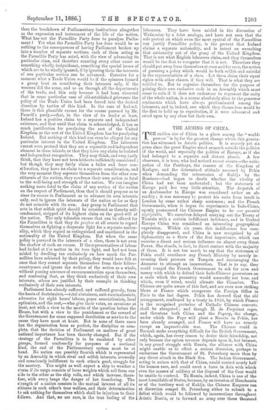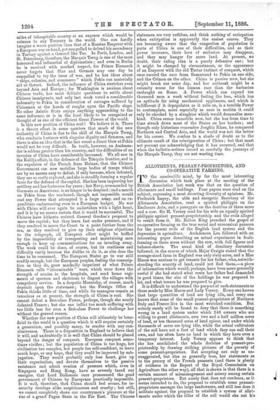THE ARMING OF CHINA.
THE sudden rise of China to a place among the " world- powers " is by far the greatest change which this genera-
tion has witnessed in Asiatic politics. It is scarcely yet six years since the great Empire stood as much outside the politics of the world, and especially the politics of Europe, as if she had belonged to a separate and distant planet. A few observers, it is true, who had noticed recent events—the extir- pation of the Panthays, the erasure of the Kingdom of Kashgar, and the determined attitude assumed by Pekin when demanding the retrocession of Kuldj t by the Russians—had begun to doubt whether• the vitality of China had not been underrated ; but the statesmen of Europe paid her very little attention. The despatch of an Ambassador to Europe was considered rather an ab- surdity ; it was necessary to protect his suite from insult in London by some rather sharp sentences ; and the French Government, when it began its experiments in Indo-China, openly pronounced the Chinese Empire to be une quantal negligeable. We ourselves delayed carrying out the Treaty of Tientsin with a certain indifferent indolence, and in Central Europe China was considered an interesting geographical expression. Within six years this indifference has com- pletely disappeared, and China is now recognised by all diplomatists as a State of the first importance, which can exercise a direct and serious influence on almost every Great Power. She stands, in fact, in direct contact with the majority of them. It is not too much to say that the statesmen of Pekin could overthrow any French Ministry by merely in- creasing their pressure on Tonquin and encouraging the Anamese to attempt an insurrection. That is to say, they could compel the French Government to ask for men and money with which to defend their Indo-Chinese possessions on a scale which the peasantry would assuredly not bear, and which, even if voted, would alienate the Chamber. The Chinese are quite aware of this fact, and are even now striking blows at France which exasperate the Foreign Office in Paris to the last degree. Pekin has decreed that the old arrangement, confirmed by a treaty in 1859, by which France is the recognised protector of Catholic Chinese converts, shall be abrogated ; and though M. de Freycinet rages, and threatens both China and the Papacy, the change, under which the Pope will plant a Nuncio in Pekin, has been already arranged, and France will have no remedy except an impracticable war. The Chinese could in Burmah make everything difficult for the British Government, which, again, has every reason to desire their friendship, not only because the opium revenue depends upon it, but because, in any grand struggle with Russia, the alliance with China might enable us to effect a serious diversion, perhaps to embarrass the Government of St. Petersburg more than by any direct attack in the Black Sea. The Indian Government, acting in unison with that of China, would control nearly half the human race, and could exert a force in Asia with which even the masses of soldiery at the disposal of the Czar would be unable to contend. To Russia, indeed, China is one of the moat formidable of States, because, by an invasion of Manchooria or of the territory west of Kuldja, the Chinese Emperor can at discretion compel St. Petersburg either to submit to a defeat which would be followed by insurrections throughout Asiatic Russia, or to forward an army over three thousand miles of inhospitable country at an expense which would be ruinous to any Treasury in the world. One can hardly imagine a worse position than that of a Russian Emperor with a European war on hand, yet compelled to defend his ascendency in Tartary against a General like Teo. In Paris, London, and St. Petersburg, therefore, the Marquis Tseng is one of the most honoured and influential of diplomatists ; and even in Berlin he is received with marked respect, for Prince Bismarck never forgets that Slav and German may one day be compelled to try the issue of war, and he has ideas about " ships, colonies, and commerce " which Pekin can materially aid or thwart. Indeed, the influence of China stretches even beyond Asia and Europe ; for Washington is anxious about Chinese trade, has most delicate questions to settle about Chinese immigrants, and only last week voted a considerable indemnity to Pekin in consideration of outrages suffered by Chinamen at the hands of roughs upon the Pacific slope. No other Asiatic State enjoys anything approaching to the same influence, or is in the least likely to be recognised or thought of as one of the efficient Great Powers of the world.
Is this new position of China real ? We believe it is. There is a theory afloat in some quarters that much of the new authority of China is due to the skill of the Marquis Tseng, who conducts business with singular dignity and firmness, and there is also an idea that in the last resort a direct blow at Pekin would not be very difficult. In truth, however, an Ambassa- dor is seldom greater than his country, and the difficulties of an invasion of China have considerably increased. We all saw in the Kuldja affair, in the defence of the Tonquin frontier, and in the expulsion of the French from Hainan, that the Chinese Government can now mobilise large bodies of troops which are by no means easy to defeat, if only because, when defeated, they are so easily replaced, and she is steadily forming a regular force for the defence of the capital. She has been improving her artillery and her fortresses for years ; her Navy, commanded by Germans or Americans, is no longer to be despised ; and a march on Pekin from the sea-board, though not impossible, would cost any Power that attempted it a large army, and an ex- penditure embarrassing even to a European budget. No war with China will ever again be undertaken with a light heart, and it is by no means certain that it would be successful. The Chinese have hitherto resisted General Gordon's proposal to move the capital ; but they learn fast under pressure, and if they resolved to move the Court to a point further from the sea, as they resolved to give up their religious objections to the telegraph, all European effort might be baffled by the impossibility of transporting and maintaining men enough to keep up communications for an invading army. The work could be done, of course, but its costliness and difficulty vastly increase the dislike to do it, as also does the time to be consumed. The European States go to war still readily enough, but the European peoples, feeling the conscrip- tion as they do, grow markedly impatient of what Prince Bismarck calls " interminable " wars, which wear down the strength of armies in the hospitals, and send home regi- ments of spectres and skeletons to disgust the villages with compulsory service. In a despotic Monarchy, of course, much depends upon the statesmen ; but the Foreign Office of Pekin thinks little of time, and while its managers remain as tenacious as at present, the strength of China is real. She cannot defeat a first-class Power, perhaps, though she nearly defeated France ; but she can inflict too much suffering with too little loss for even a first-class Power to challenge her without the gravest reason.
Whether the new position of China will ultimately be bene- ficial to the world is a question which it will require certainly a generation, and possibly many, to resolve with any con- clusiveness. There is a disposition in England to believe that it will, and undoubtedly it is well that China should be placed beyond the danger of conquest. European conquest some- times vivifies ; but the population of China is too huge, her civilisation too complex, her people too self-confident, to leave much hope, or any hope, that they could be improved by sub- jugation. They would probably only lose heart, give up their organisation, and devote themselves to the passive resistance and adroit evasion of pressure which, even in Singapore and Hong Kong, have so severely taxed our energies, that Lord Dalhousie once pronounced the good government of Chinese by Europeans practically impossible. It is well, therefore, that China should feel secure, for in- security develops alike suspiciousness and cruelty ; but still, we cannot completely share our countrymen's pleasure at the rise of a grand Pagan State in the Far East. The Chinese statesmen are very ruthless, and think nothing of extirpation when extirpation is apparently the easiest course. They are becoming aware that the congestion of population in parts of China is one of their difficulties, and as their power increases, their love of seclusion may disappear, and they may hunger for more land. At present, no doubt, their ruling idea is a purely defensive one ; but it might be changed by circumstances, or the appearance of an Emperor with the old Tartar instinct of conquest, which once carried the race from Samarcand to Pekin on one side, and the Crimea on the other. China is passive now, but she might break out some day, and her outbreak might be a calamity worse for the human race than the barbarian onslaught on Rome. A Power which can expend ten thousand men a week without feeling the loss, which has an aptitude for using mechanical appliances, and which is indifferent if it depopulates as it rolls on, is a terrible Power to contemplate, more especially as once in motion it could only be checked by a slaughter which would demoralise man- kind. China seems immobile now, but she has from time to time struck down most of the States on her borders ; and though only historians remember Jenghiz Khan, he conquered Northern and Central Asia, and the world was not the better for his career. We confess to a shade of doubt as to the ultimate result of the reinvigoration of China ; but that must not prevent our acknowledging that it has occurred, and that when the bulletin-writers record so carefully the journeys of the Marquis Tseng, they are not wasting time.



































 Previous page
Previous page